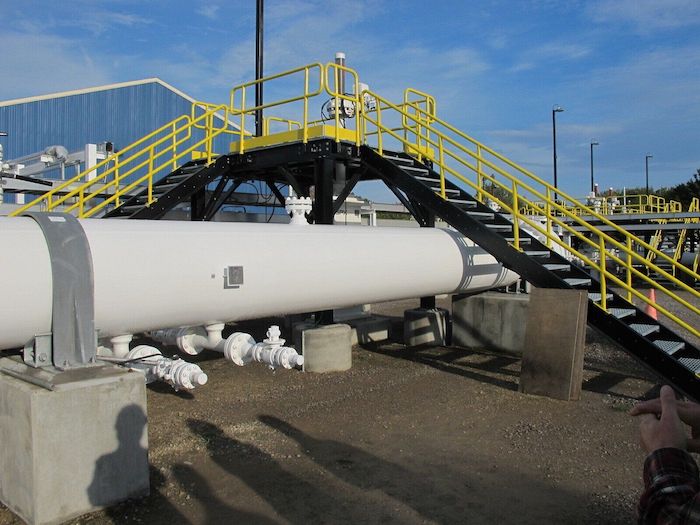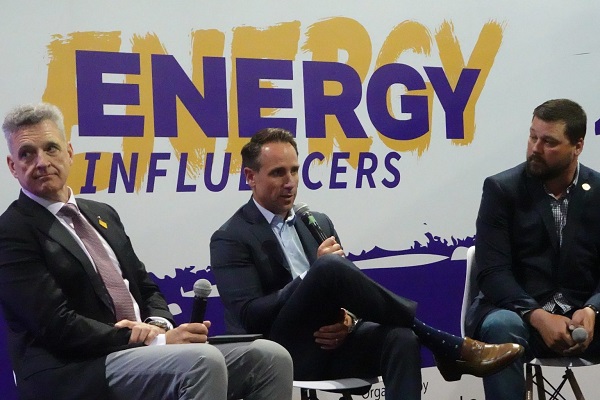Energy
Judge grants motion by state of Michigan to appeal key decision in Line 5 dispute

By James McCarten in Washington
The U.S. judge presiding over Michigan’s bid to shut down the Line 5 pipeline has given her blessing to the state to appeal one of her key findings, breathing new life into a strategy that hinges on getting the dispute heard by a lower court.
Back in August, District Court Judge Janet Neff rejected a motion from Michigan Attorney General Dana Nessel to send the case back to state court, where Nessel has acknowledged they have a better chance of winning.
But earlier this week, Neff granted Nessel’s request to certify that August decision, clearing the way for what’s known as an interlocutory appeal — formally asking an appeals court to reverse a judge’s order before a final decision in the case has been made.
Such certifications, rare in U.S. law, must meet certain conditions, Neff wrote in a decision Tuesday: that they involve a “controlling question of law” that’s likely to generate a difference of opinion, and that an appeal could expedite a resolution.
“Having reviewed the record, the court concludes that this dispute is one of the exceptional situations that compels certification,” the order reads.
“Each of the three issues identified by (the) plaintiff involve a controlling question of law, there is substantial ground for difference of opinion, and an immediate appeal will materially advance the ultimate termination of the litigation.”
Neff has also ordered that the current case — just one of several open files involving Enbridge Inc., Line 5 and the state of Michigan — remain stayed and administratively closed until the appeal is resolved.
Michigan has been in court for years with Calgary-based Enbridge in an effort to shut down Line 5, fearing a disaster in the Straits of Mackinac, the ecologically sensitive region where the pipeline crosses the Great Lakes.
Enbridge and its allies, which include the federal Liberal government in Ottawa, insist the pipeline is safe, that planned upgrades will make it even safer, and that a shutdown would impart too great a cost for the North American economy to bear.
The legal saga, however, has been dominated almost from the start by arcane procedural questions about jurisdiction and precedent, with Tuesday’s decision likely to deepen that morass even more.
Nessel has made three central arguments: that Enbridge flouted a 30-day window to move the case to district court; that Neff relied too heavily on her own earlier decision to reject Nessel’s motion in a separate but nearly identical Line 5 case; and that the question of jurisdiction has not been properly settled.
“The attorney general believes that the federal trial court clearly erred when it refused to send the case back to state court,” Nessel’s office said in a statement. “The order allows (Nessel) to ask the federal court of appeals to step in and right this wrong.”
Environmental groups in Michigan that back the state’s efforts against Line 5 also cheered the decision.
“This ruling is good news for the Great Lakes. Enbridge’s use of the federal courts to delay the state’s ability to protect the Great Lakes is unconscionable,” National Wildlife Federation counsel Andy Buchsbaum said in a statement.
“We hope that this will get the case back on track quickly so the Great Lakes doesn’t suffer from a massive oil spill.”
Enbridge, for its part, sees things differently.
A statement from the company cited Neff’s own words from the August 2022 decision in which she accused Nessel of seeking “a race to judgment and a collision course between the state and federal forum.”
“The attorney general seeks to undermine these considerations and promote gamesmanship and forum shopping,” Enbridge said, “while ignoring the substantial federal issues that are properly decided in federal court and not state court.”
This report by The Canadian Press was first published Feb. 23, 2023.
Business
Senator wants to torpedo Canada’s oil and gas industry

From the Fraser Institute
Recently, without much fanfare, Senator Rosa Galvez re-pitched a piece of legislation that died on the vine when former prime minister Justin Trudeau prorogued Parliament in January. Her “Climate-Aligned Finance Act” (CAFA), which would basically bring a form of BDS (Boycott, Divestment, and Sanctions) to Canada’s oil and gas sector, would much better be left in its current legislative oblivion.
CAFA would essentially treat Canada’s oil and gas sector like an enemy of the state—a state, in Senator Galvez’ view, where all values are subordinate to greenhouse gas emission control. Think I’m kidding? Per CAFA, alignment with national climate commitments means that everyone engaged in federal investment in “emission intensive activities [read, the entire oil and gas sector] must give precedence to that duty over all other duties and obligations of office, and, for that purpose, ensuring the entity is in alignment with climate commitments is deemed to be a superseding matter of public interest.”
In plain English, CAFA would require anyone involved in federal financing (or federally-regulated financing) of the oil and gas sector to divest their Canadian federal investments in the oil and gas sector. And the government would sanction those who argue against it.
There’s another disturbing component to CAFA—in short, it stacks investment decision-making boards. CAFA requires at least one board member of every federally-regulated financial institution to have “climate expertise.” How is “climate expertise” defined? CAFA says it includes people with experience in climate science, social science, Indgineuous “ways of knowing,” and people who have “acute lived experience related to the physical or economic damages of climate change.” (Stacking advisory boards like this, by the way, is a great way to build public distrust in governmental advisory boards, which, in our post-COVID world, is probably not all that high. Might want to rethink this, senator.)
Clearly, Senator Galvez’ CAFA is draconian public policy dressed up in drab finance-speak camouflage. But here’s what it would do. By making federal investment off-limits to oil and gas companies, it would quickly put negative pressure on investment from both national and international investors, effectively starving the sector for capital. After all, if a company’s activities are anathema to its own federal regulators or investment organs, and are statutorily prohibited from even verbally defending such investments, who in their right minds would want to invest?
And that is the BDS of CAFA. In so many words, it calls on the Canadian federal government to boycott, divest from, and sanction Canada’s oil and gas sector—which powers our country, produces a huge share of our exports, and employs people from coast to coast. Senator Galvez would like to see her Climate-Aligned Finance Act (CAFA) resurrected by the Carney government, whose energy policy to-date has been less than crystal clear. But for the sake of Canadians, it should stay dead.
Energy
Who put the energy illiterate in charge?

This article supplied by Troy Media.
Canada’s energy policy is being shaped by politicians who don’t actually understand how energy works. That’s not just embarrassing. It’s dangerous
Canada’s energy future is being held back by a critical obstacle: our elected officials don’t understand energy.
At all three levels of government, most politicians lack even a basic grasp of how our energy systems function. That ignorance isn’t just a knowledge gap—it’s a leadership crisis. Energy systems are evolving rapidly, and our leaders are ill-equipped to manage the complexity, tradeoffs and consequences involved. With few exceptions, their understanding is superficial, shaped more by talking points than substance.
By “energy systems,” I mean the complex web of technologies, infrastructure, markets and regulations that generate, distribute and manage power—from oil and gas to hydro, nuclear, wind and solar. These systems are deeply interconnected, constantly changing and central to every aspect of modern life. Yet the people making decisions about them often have little idea how they actually work.
This shows up frequently in public life: dodged questions, scripted answers, vague platitudes. Many politicians skate across the surface of issues with the thinnest understanding. The old adage “a little knowledge is a dangerous thing” perfectly describes Canadian energy politics today.
Decisions about energy directly affect household utility bills, climate goals, industrial competitiveness and grid reliability. Yet politicians tend to be tethered to the dominant energy source in their own region—oil and gas in Alberta, hydro in Quebec, nuclear in Ontario—without grasping how those systems connect or conflict. Canada’s energy landscape is fragmented, with each province operating under its own regulatory framework, infrastructure constraints and political pressures. That makes coordination difficult and systems-level thinking essential.
This isn’t a left-versus-right issue. It’s not oil and gas versus renewables. It’s a national failure to understand the integrated systems that power our lives and economy. Canada is, functionally, energy illiterate, and our elected officials reflect that reality. We flip a switch, pump gas, turn up the thermostat and rarely ask how or why it works, or what it costs in environmental or economic terms.
Take the Clean Electricity Regulations as one example. Introduced by the federal government to drive Canada’s electricity grid to net-zero emissions by 2035, the CERs require provinces to sharply reduce or eliminate fossil fuel-based power. But in Alberta and Saskatchewan, where coal and natural gas still dominate, those regulations landed with a thud. The federal government failed to account for regional infrastructure limitations, market structure
differences and technology readiness. The result? Immediate backlash, legal threats and political gridlock—not because climate action is unwelcome, but because the policy was crafted in a vacuum of systems-level understanding.
Adding to the problem is the dominance of bureaucrats and political handlers in shaping what passes for energy messaging. Speeches are often a patchwork of statistics and sanitized clichés, stripped of nuance or depth. Many politicians simply deliver what they’re handed, guided more by risk management than insight. The result is policy that’s disconnected from the realities it aims to change.
A handful of elected officials do have real-world energy experience, but even that is often narrow, based on one role or one sector. It rarely translates into the kind of broad, integrated knowledge needed to lead across multiple interdependent systems. The risks of this fragmented thinking are immense.
What’s needed is mandatory education—an energy information and insights toolkit for anyone seeking public office. This shared curriculum would cover how electricity and fuel systems work, the economics of energy markets, climate dynamics, environmental trade-offs and public policy principles. It should be grounded in both natural and social sciences and structured to develop systems thinking, so that decisions are informed by how energy technologies, markets and governance truly interact.
Imagine if thousands of politicians—urban and rural, left and right, federal and local—learned from the same textbook. Politics wouldn’t vanish. Disagreements wouldn’t disappear. But the debate would shift from tribal talking points to informed discussion.
And for once, Canada might start moving forward on energy, not with noise or paralysis, but with purpose.
Bill Whitelaw is a director and advisor to many industry boards, including the Canadian Society for Evolving Energy, which he chairs. He speaks and comments frequently on the subjects of social licence, innovation and technology, and energy supply networks.
Troy Media empowers Canadian community news outlets by providing independent, insightful analysis and commentary. Our mission is to support local media in helping Canadians stay informed and engaged by delivering reliable content that strengthens community connections and deepens understanding across the country.
-

 espionage2 days ago
espionage2 days agoFrom Sidewinder to P.E.I.: Are Canada’s Political Elites Benefiting from Beijing’s Real Estate Reach?
-

 Business2 days ago
Business2 days agoSenator wants to torpedo Canada’s oil and gas industry
-

 Bruce Dowbiggin2 days ago
Bruce Dowbiggin2 days agoFUBAR: How Trudeau & Trump Rewrote This Century’s Political Handbook
-

 Alberta2 days ago
Alberta2 days agoAlberta’s carbon diet – how to lose megatonnes in just three short decades
-

 Energy2 days ago
Energy2 days agoWho put the energy illiterate in charge?
-

 Agriculture2 days ago
Agriculture2 days agoUnstung Heroes: Canada’s Honey Bees are not Disappearing – They’re Thriving
-

 espionage2 days ago
espionage2 days agoFBI Buried ‘Warning’ Intel on CCP Plot to Elect Biden Using TikTok, Fake IDs, CCP Sympathizers and PRC Students—Grassley Probes Withdrawal
-

 David Clinton2 days ago
David Clinton2 days agoWhy Are Ontario’s Public Schools So Violent?








